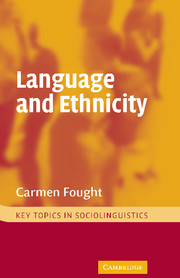Book contents
- Frontmatter
- Contents
- Preface
- Acknowledgments
- Part I General issues in ethnicity and language
- 1 What is ethnicity?
- 2 Language and the construction of ethnic identity
- Part II Linguistic features and ethnicity in specific groups
- Part III The role of language use in ethnicity
- Notes
- Glossary of terms
- References
- Index
- References
1 - What is ethnicity?
Published online by Cambridge University Press: 05 September 2012
- Frontmatter
- Contents
- Preface
- Acknowledgments
- Part I General issues in ethnicity and language
- 1 What is ethnicity?
- 2 Language and the construction of ethnic identity
- Part II Linguistic features and ethnicity in specific groups
- Part III The role of language use in ethnicity
- Notes
- Glossary of terms
- References
- Index
- References
Summary
Race is not rocket science. It's harder than rocket science.
(Christopher Edley, Jr., Foreword to America Becoming: Racial Trends and Their Consequences, vol. 1, 2001)As a professor, I've noticed a recent trend of resistance among my students to forms that ask them to specify their ethnicity by checking a box. They see it variously as racist, irrelevant, inaccurate, or nobody's business but their own. Several students have told me that they respond to such forms by marking “other___” and writing in next to it simply “human being.” I respect their choice to do this and I applaud their small protest against the way that such forms oversimplify the question of ethnicity in our diverse and complex world. However, I also know as a social scientist that most “human beings” do not see themselves as members of a great undifferentiated whole. Whatever our political leanings, however open and accepting of others our character might be, we nonetheless tend to cling to the distinctions among us. Most teenagers in Western societies, for instance, would die of embarrassment if somebody thought that they dressed like, acted like, or talked like their parents. They go to great lengths to avoid this possibility, including developing new slang terms and discarding them like used tissues, in an attempt to stay one step ahead of the game. In our heterosexually oriented modern communities, men do not usually like to be mistaken for women and vice versa.
- Type
- Chapter
- Information
- Language and Ethnicity , pp. 3 - 18Publisher: Cambridge University PressPrint publication year: 2006

